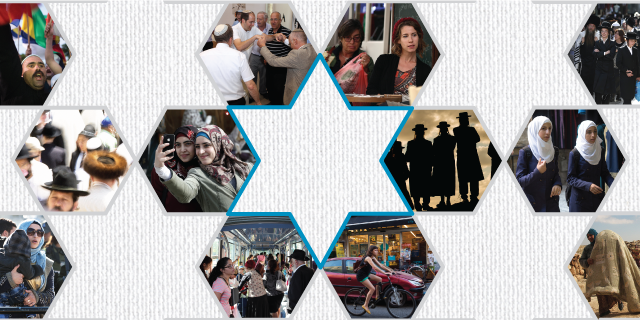

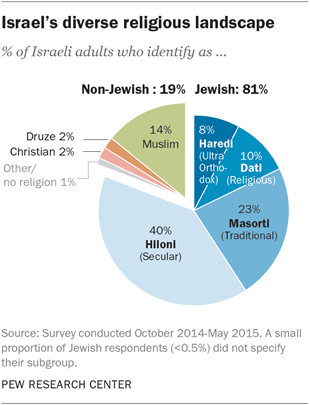
Nearly 70 years after the establishment of the modern State of Israel, its Jewish population remains united behind the idea that Israel is a homeland for the Jewish people and a necessary refuge from rising anti-Semitism around the globe. But alongside these sources of unity, a major new survey by Pew Research Center also finds deep divisions in Israeli society – not only between Israeli Jews and the country’s Arab minority, but also among the religious subgroups that make up Israeli Jewry.
Nearly all Israeli Jews identify with one of four categories: Haredi (commonly translated as “ultra-Orthodox”), Dati (“religious”), Masorti (“traditional”) or Hiloni (“secular”).
Although they live in the same small country and share many traditions, highly religious and secular Jews inhabit largely separate social worlds, with relatively few close friends and little intermarriage outside their own groups. In fact, the survey finds that secular Jews in Israel are more uncomfortable with the notion that a child of theirs might someday marry an ultra-Orthodox Jew than they are with the prospect of their child marrying a Christian. (See Chapter 11 for more information.)
Moreover, these divisions are reflected in starkly contrasting positions on many public policy questions, including marriage, divorce, religious conversion, military conscription, gender segregation and public transportation. Overwhelmingly, Haredi and Dati Jews (both generally considered Orthodox) express the view that Israel’s government should promote religious beliefs and values, while secular Jews strongly favor separation of religion from government policy.
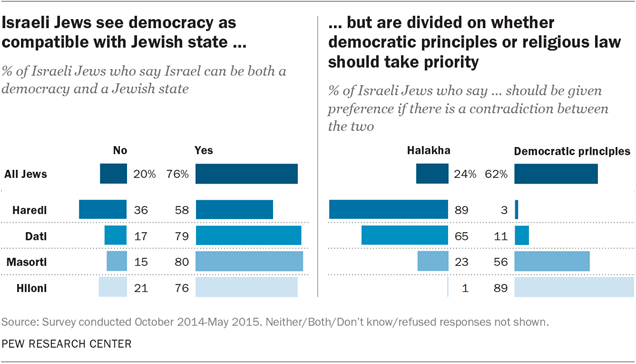
Most Jews across the religious spectrum agree in principle that Israel can be both a democracy and a Jewish state. But they are at odds about what should happen, in practice, if democratic decision-making collides with Jewish law (halakha). The vast majority of secular Jews say democratic principles should take precedence over religious law, while a similarly large share of ultra-Orthodox Jews say religious law should take priority.
Even more fundamentally, these groups disagree on what Jewish identity is mainly about: Most of the ultra-Orthodox say “being Jewish” is mainly a matter of religion, while secular Jews tend to say it is mainly a matter of ancestry and/or culture.
To be sure, Jewish identity in Israel is complex, spanning notions of religion, ethnicity, nationality and family. When asked, “What is your present religion, if any?” virtually all Israeli Jews say they are Jewish – and almost none say they have no religion – even though roughly half describe themselves as secular and one-in-five do not believe in God. For some, Jewish identity also is bound up with Israeli national pride. Most secular Jews in Israel say they see themselves as Israeli first and Jewish second, while most Orthodox Jews (Haredim and Datiim) say they see themselves as Jewish first and then Israeli.
The survey also looks at differences among Israeli Jews based on age, gender, education, ethnicity (Ashkenazi or Sephardi/Mizrahi) and other demographic factors. For example, Sephardim/Mizrahim are generally more religiously observant than Ashkenazim, and men are somewhat more likely than women to say halakha should take precedence over democratic principles. But in many respects, these demographic differences are dwarfed by the major gulfs seen among the four religious subgroups that make up Israeli Jewry.
Nearly all Israeli Jews interviewed in this survey self-identify as Haredi, Dati, Masorti or Hiloni. Here’s a brief description of what the survey shows about these categories.
Haredi (9% of Jews, 8% of all Israeli adults)
Though often translated as “ultra-Orthodox,” the Hebrew word Haredi literally means trembling or fearing God. The survey shows that Jews who describe themselves as Haredim are generally highly observant of Jewish religious law (halakha), and they express a strong preference for a state in which religious law would take precedence over democratic principles.
Dati (13% of Jews, 10% of all Israeli adults)
Literally meaning religious, Dati is sometimes translated as “modern Orthodox.” The survey finds that most Datiim are traditionally observant (keeping kosher and observing the Sabbath, for example). But they are more integrated into Israel’s overall society than Haredim, and Dati men are much more likely than Haredi men to have served in the Israeli military.
Masorti (29% of Jews, 23% of all Israeli adults)
Translated as “traditional,” Masortim occupy a broad middle ground between Orthodoxy and secularism, and they report widely varying levels of observance. In terms of their religious beliefs and practices, Masortim are the most diverse of these four self-defined types of Jews.
Hiloni (49% of Jews, 40% of all Israeli adults)
Though nominally “secular,” many Hilonim observe some religious traditions, such as keeping kosher and fasting on Yom Kippur. But they generally oppose the Orthodox rabbinate’s control over marriage and divorce, and they say democratic principles should take precedence over religious law.
While most Israelis are Jewish, a growing share (currently about one-in-five adults) belong to other groups. Most non-Jewish residents of Israel are ethnically Arab and identify, religiously, as Muslims, Christians or Druze.1
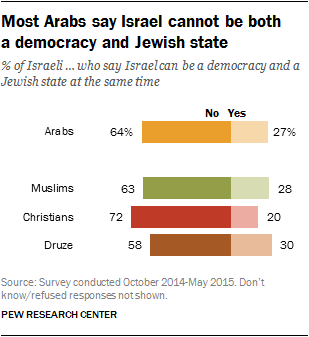
The survey shows that Israeli Arabs generally do not think Israel can be a Jewish state and a democracy at the same time. This view is expressed by majorities of Muslims, Christians and Druze. And overwhelmingly, all three of these groups say that if there is a conflict between Jewish law and democracy, democracy should take precedence.
But this does not mean most Arabs in Israel are committed secularists. In fact, many Muslims and Christians support the application of their own religious law to their communities. Fully 58% of Muslims favor enshrining sharia as official law for Muslims in Israel, and 55% of Christians favor making the Bible the law of the land for Christians.
Roughly eight-in-ten Israeli Arabs (79%) say there is a lot of discrimination in Israeli society against Muslims, who are by far the biggest of the religious minorities. On this issue, Jews take the opposite view; the vast majority (74%) say they do not see much discrimination against Muslims in Israel.
At the same time, Jewish public opinion is divided on whether Israel can serve as a homeland for Jews while also accommodating the country’s Arab minority. Nearly half of Israeli Jews say Arabs should be expelled or transferred from Israel, including roughly one-in-five Jewish adults who strongly agree with this position.
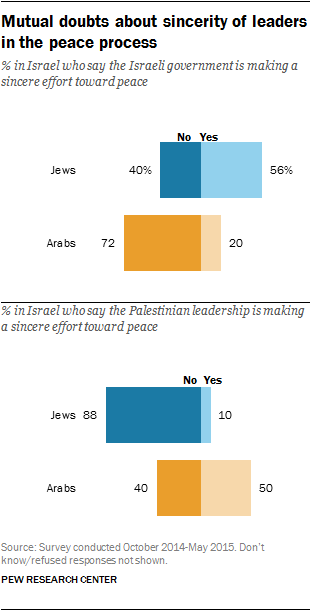
The divisions between Jews and Arabs are also reflected in their views on the peace process. In recent years, Arabs in Israel have become increasingly doubtful that a way can be found for Israel and an independent Palestinian state to coexist peacefully. As recently as 2013, roughly three-quarters of Israeli Arabs (74%) said a peaceful two-state solution was possible. As of early 2015, 50% say such an outcome is possible.
Israeli Arabs are highly skeptical about the sincerity of the Israeli government in seeking a peace agreement, while Israeli Jews are equally skeptical about the sincerity of Palestinian leaders. But there is plenty of distrust to go around: Fully 40% of Israeli Jews say their own government is not making a sincere effort toward peace, and an equal share of Israeli Arabs say the same about Palestinian leaders.
Israel’s major religious groups also are isolated from one another socially. The vast majority of Jews (98%), Muslims (85%), Christians (86%) and Druze (83%) say all or most of their close friends belong to their own religious community.
Jews are more likely than Arabs to say all their friends belong to their religious group. To some extent, this may reflect the fact that the majority of Israel’s population is Jewish. Two-thirds of Israeli Jews (67%) say all of their friends are Jewish. By comparison, 38% of Muslims, 21% of Christians and 22% of Druze say all their friends share their religion.
These are some of the key findings of Pew Research Center’s comprehensive survey of religion in Israel, which was conducted through face-to-face interviews in Hebrew, Arabic and Russian among 5,601 Israeli adults (ages 18 and older) from October 2014 through May 2015. The survey uses the Israeli Central Bureau of Statistics’ definition of the Israeli population, which includes Jews living in the West Bank as well as Arab residents of East Jerusalem. See survey methodology for more details.
The survey includes interviews with citizens and residents living within the boundaries of Israel, as defined in the 2008 census conducted by Israel’s Central Bureau of Statistics. Jews were surveyed in all six census districts (Jerusalem, North, Haifa, Center, Tel Aviv and South) and in the West Bank.
Jewish residents of all areas categorized as “Judea and Samaria” (West Bank) by the Central Bureau of Statistics were eligible to be included in the sample. Some examples of West Bank communities where interviews were conducted include Beit Arye, Elkana, Ma’ale Adumim and Giv’at Ze’ev.
All Arab citizens of Israel were eligible to be included in the sample. In addition, the survey includes interviews with Arab residents of East Jerusalem.
Arab residents of Gaza and the West Bank outside of East Jerusalem were not included in the survey. The Palestinian population has been previously surveyed by the Pew Research Center as recently as 2015.
For additional details about the sample, including a map of the areas covered, see survey methodology.
The survey includes oversamples (i.e., additional interviews, over and above the number that would occur in a purely random sample) of five groups – Christians, Druze, Haredi Jews, Arabs living in East Jerusalem and Israeli settlers in the West Bank – in order to be able to analyze the views of people in these relatively small groups. However, the oversamples are statistically adjusted in the survey’s final results so that Christians, Druze, Haredim, Arabs in East Jerusalem and Israeli settlers are represented in proportion to their actual share of the Israeli adult population.
The survey probes Israelis’ religious identification, beliefs and practices; views on democracy and religion’s role in public life; moral values and life goals; perceptions about discrimination; views on intermarriage; and attitudes toward politics and the peace process.
Using data from Pew Research Center’s 2013 study “A Portrait of Jewish Americans,” the report also makes comparisons between Jews in Israel and Jews in the United States. There are deep connections between the world’s two largest Jewish populations, but also some key differences. For instance, Israeli Jews overall are more religiously observant than U.S. Jews. Politically, American Jews are more optimistic about the possibility of a peaceful two-state solution and more negative about Jewish settlements in the West Bank than are Israeli Jews. U.S.-Israeli comparisons are discussed in detail in Chapter 1.
The 2015 Pew Research Center survey of Israel includes interviews with 3,789 Jews, 871 Muslims, 468 Christians and 439 Druze. An additional 34 respondents belong to other religions or are religiously unaffiliated.
Respondents are analyzed as part of these religious groups based on their response to the following question: “What is your present religion, if any? Are you Jewish, Muslim, Christian, Druze, another religion or no religion?”
All respondents classified as Muslims, Christians and Druze in this study identified themselves as such in response to the religious identity question. The vast majority of Jews (3,725) also said they are Jewish when asked about their religion. In addition, 64 respondents who identified as having “no religion” said, in response to a subsequent question, that they consider themselves Jewish aside from religion and had a Jewish upbringing (they were either raised Jewish in some way or had at least one Jewish parent). These respondents, who make up roughly 2% of the total Jewish sample, are classified as Jewish in this survey.
This approach parallels the methods used to define Jews in Pew Research Center’s 2013 survey of U.S. Jews, which included interviews with 3,475 Jewish respondents. But unlike in Israel, where the vast majority of Jews identified as Jewish by religion, in the U.S. survey roughly one-in-five Jews said they have no religion but that they consider themselves Jewish aside from religion and had a Jewish parent or upbringing.
Together, the current study and the previously published survey of Jewish Americans provide an in-depth look at the religious beliefs, values, and social and political views of an estimated 80% of the world’s Jewish population. These studies, funded by The Pew Charitable Trusts and the Neubauer Family Foundation, are part of a larger effort by Pew Research Center to understand religious change and its impact on societies around the world.
The rest of this Overview explores some sources of both unity and division in Israeli society, as revealed by the survey. While the major subgroups of Israeli Jews are united in their support of Israel as a Jewish homeland, they are deeply at odds over the role that religion should play in their country’s public life. And although Jews, Muslims, Christians and Druze in Israel share many life goals – placing great emphasis on maintaining strong families and obtaining a good education for their children, for example – they live religiously balkanized lives.
Israeli Jews united on need for Jewish homeland
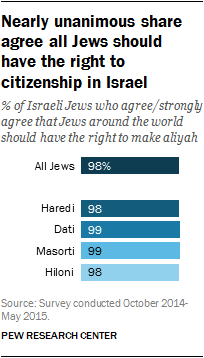
Israel is no longer a predominantly immigrant society; at present, roughly three-quarters of Israeli adults are natives, and just one-quarter were born abroad. Yet with virtual unanimity, Israeli Jews of every kind – native-born and immigrant, young and old, secular and highly religious – agree that all Jews everywhere should have the right to make “aliyah,” or move to Israel and receive immediate citizenship.2
This overwhelming support for Jewish immigration may be linked, in part, to perceptions about anti-Semitism. Fully three-quarters of Israeli Jews (76%) think that anti-Semitism is both common and increasing around the world, and roughly nine-in-ten (91%) say that a Jewish state is necessary for the long-term survival of the Jewish people.
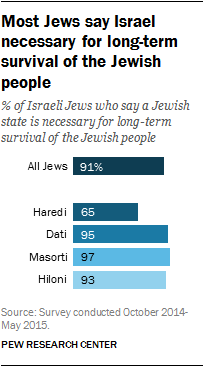
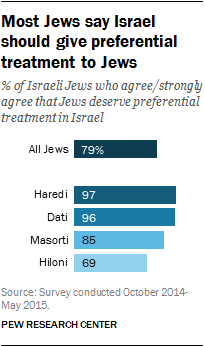
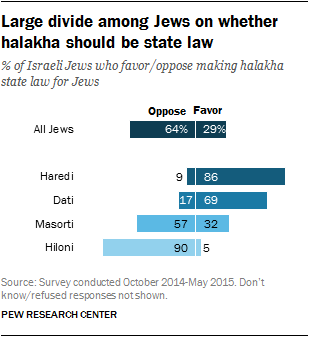
Most Israeli Jews (79%) say Jews deserve preferential treatment in Israel. But they do not see an inherent contradiction between a Jewish homeland and a functioning democracy. Asked whether Israel can be both a Jewish state and a democratic one, majorities of all four Jewish subgroups say “yes.” However, Haredim are less certain than other Israeli Jews that democracy is compatible with Jewish statehood. While a slim majority of Haredim surveyed (58%) say Israel can be both a Jewish state and a democracy, about one-third (36%) say it cannot.
This may be because many Haredim believe that religious law (halakha) should trump democratic decision-making. To test this, the survey posed a hypothetical question: “And if there is a contradiction between halakha and democratic principles, should the State of Israel give preference to democratic principles or halakha?” In such a situation, 89% of Haredim say halakha should be given preference, and only 3% of Haredi respondents would defer to democratic ideals. By contrast, among Hilonim, an equally lopsided share (89%) say the state should give preference to democratic principles; just 1% of secular Jewish respondents would yield to halakha.
When asked whether halakha should be made the official law of the land for Jews in Israel, majorities of Haredim (86%) and Datiim (69%) say they would favor this change. By contrast, most Masortim (57%) and an overwhelming majority of Hilonim (90%) oppose making halakha the law of the land for Jews in Israel.
The disagreements over what it means to live in a Jewish state are not merely hypothetical. The survey asks about numerous concrete policy issues in Israel – including marriage, divorce, conversion, military conscription, transportation, public prayer and gender segregation – and finds deep divides.
For example, the vast majority of Haredim and Datiim say public transportation should be shut down throughout the entire country on the Jewish Sabbath, while the vast majority of Hilonim (94%) oppose shutting down all public transport in observance of the Sabbath. Masortim are more evenly divided between those who favor shutting down public transport across the entire country on the Sabbath (44%) and those who want to keep buses, trains or other public transportation running in at least some areas (52%).
The public intermingling of men and women is another point of disagreement. A solid majority of Haredim (62%) favor gender segregation on public transportation, such as buses and trains, used by members of the Haredi community. Among Hilonim, meanwhile, just 5% favor this policy. The vast majority of Hilonim (93%) are opposed to enforcing gender segregation on any public transport, even when it is used by Haredim.
There is also debate on issues concerning family law. Israel does not allow civil marriage, and Jewish marriages conducted in Israel must be sanctioned by Orthodox rabbis. (For more details on marriage and divorce in Israel, see Chapter 11.) Haredim strongly oppose allowing non-Orthodox rabbis to conduct marriages in Israel, while a majority of Hilonim favor changing the current law to allow Reform and Conservative rabbis to conduct weddings.
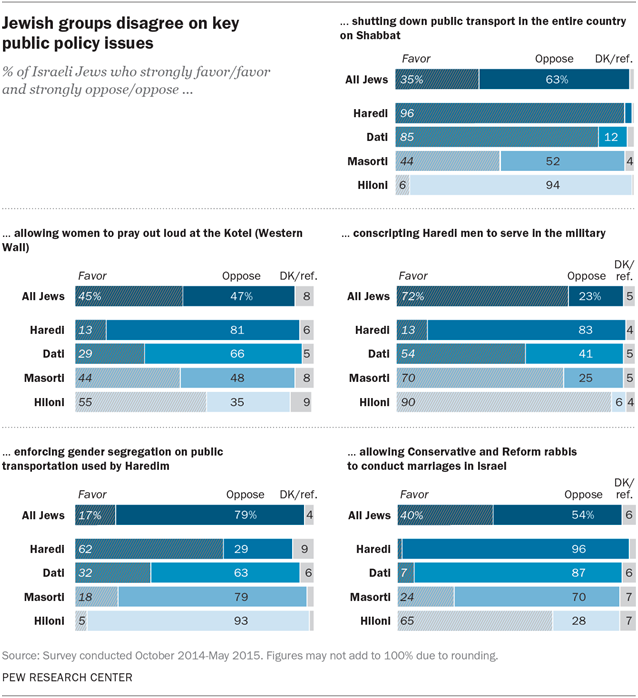
Israeli Jews divided on the status of Arabs
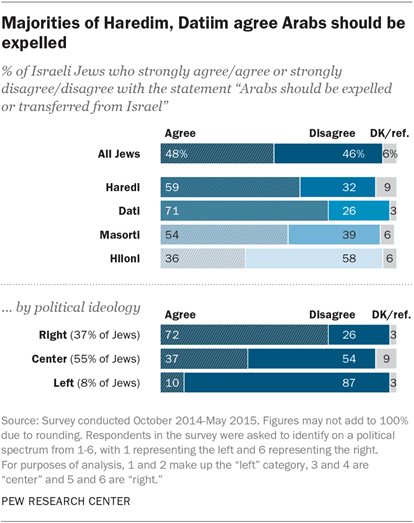
Israeli Jews are divided on the question of whether Arabs should be allowed to live in the Jewish state. The survey asked Jews whether they strongly agree, agree, disagree or strongly disagree with the statement that “Arabs should be expelled or transferred from Israel.” Roughly half of Israeli Jews strongly agree (21%) or agree (27%), while a similar share disagree (29%) or strongly disagree (17%).3
Datiim are especially likely to favor the expulsion of Arabs. Roughly seven-in-ten (71%) say Arabs should be transferred.
Hilonim lean in the other direction: Most (58%) disagree and say Arabs should not be expelled from Israel, including 25% who strongly disagree. But even among these self-described secular Israeli Jews, about one-third (36%) favor the expulsion of Arabs from the country.
Where Jews place themselves on the political spectrum – on the left, in the center or on the right – is strongly correlated with their views on the expulsion of Arabs. Among the 8% of Jews who say they lean left, an overwhelming majority either disagree (25%) or strongly disagree (61%) that Arabs should be expelled. By contrast, roughly seven-in-ten of those on the political right agree (35%) or strongly agree (36%) that Arabs should be expelled or transferred.4
More details on this question can be found in Chapter 8.
Politically, Datiim lean toward the right; most Hilonim see themselves in the center
The spectrum of religious observance in Israel – on which Haredim are generally the most religious and Hilonim the least – does not always line up perfectly with Israel’s political spectrum. On some issues, including those pertaining to religion in public life, there is a clear overlap: Haredim are furthest to the right and Hilonim are furthest to the left, with Datiim and Masortim in between.
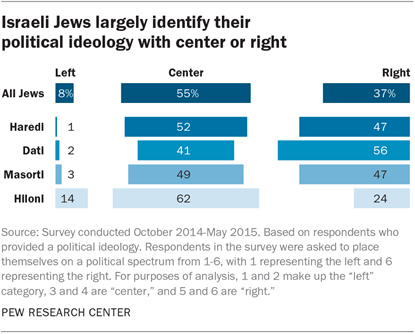
But on other political issues, including those related to the Israeli-Palestinian conflict and the expulsion of Arabs from Israel, smaller shares of Haredim than of Datiim take right-leaning positions. These differences may partly reflect the ambivalence some Haredi Jews have felt about the State of Israel ever since its establishment; some Haredi leaders opposed the formal creation of a Jewish state before the arrival of the Messiah. In addition, some Haredi leaders have, at various points in Israel’s history, advocated for centrist or left-leaning positions, such as opposing Jewish settlements in the West Bank and supporting the possibility of giving up land in a peace agreement with the Palestinians. And in pragmatic Israeli politics, the chief concern of Haredi political parties has often been the economic well-being and support of their community, while Datiim are often more ideologically motivated with respect to Israel’s security.5
Overall, more Datiim place themselves on the political right (56%) than in the center (41%). Haredim, on the other hand, are about equally likely to place themselves in the ideological center (52%) and the right (47%); the same is true of Masortim. Most Hilonim (62%) identify as political centrists. Hilonim are more likely than members of the other Jewish subgroups to place themselves on the left side of the spectrum – but, still, only 14% do so.
The survey also asked respondents what political party they identify with, if any. Within each Jewish subgroup, no single political party constitutes a majority. But at the time the survey was fielded (October 2014 to May 2015), Haredim generally supported parties that represent the interests of their community, including the Shas party and Yahadut Hatorah (United Torah Judaism).
Among Masortim and Hilonim, the most common party affiliation was Likud, the largely secular, center-right party that currently leads the ruling coalition government in Israel (Prime Minister Benjamin Netanyahu’s party). Among Hilonim, there was also some support for the center-left Avoda party (Labor), the leading opposition party to the current government; Yisrael Beytenu, a largely secular right-leaning party that draws support from many Russian immigrants; and Yesh Atid, a secular party representing mostly middle class interests.
Datiim were about equally likely to identify with Habayit Hayehudi (Jewish Home) – a right-leaning, religious Zionist and pro-settlement party – and the Shas party (a religious party that traditionally supports Mizrahi interests). Both Jewish Home and Shas are currently part of Likud’s governing coalition.
Among Arabs, there was significant support for the United Arab List, Hadash and Balad, three of the parties that have allied as the Joint List as part of the opposition to the current government.
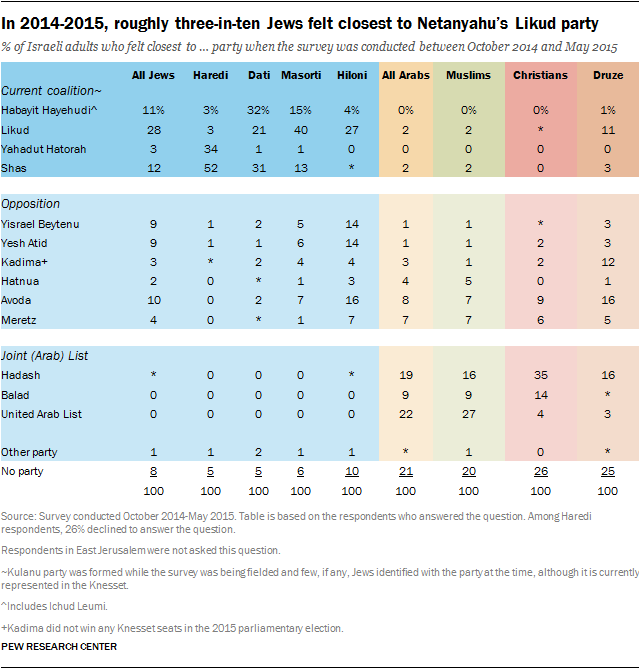
Some Jews see their Jewish identity as religious, others as cultural or ethnic
The large differences among the various Jewish groups on the kind of Jewish state they envision may be tied to fundamentally different understandings of Jewish identity.
Seven-in-ten Haredim (70%) and roughly half of Datiim (52%) say being Jewish is mainly a matter of religion, while 3% of Haredim and 16% of Datiim say being Jewish is mainly a matter of ancestry and/or culture. Among Hilonim, by contrast, only 4% see being Jewish as primarily a matter of religion, while 83% say Jewish identity is mainly a matter of ancestry and/or culture. However, at least some members of all of these groups see their Jewish identity as bound up with both religion and ancestry/culture.
(For more on Jewish identity in Israel, including a sidebar on different types of Jewish ethnic identity, see Chapter 3.)
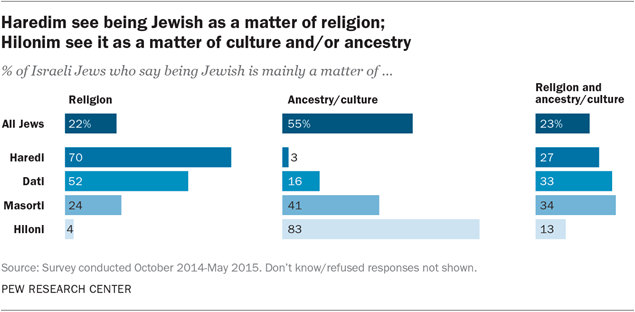
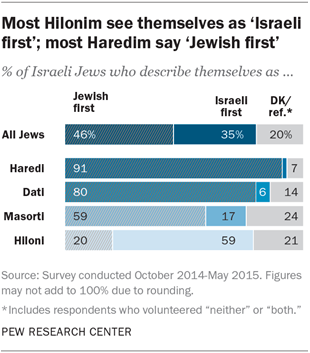
The survey also asked Israeli Jews whether they see themselves as Jewish first or Israeli first. About nine-in-ten Haredim (91%), eight-in-ten Datiim (80%) and roughly six-in-ten Masortim (59%) consider themselves Jewish first, while about six-in-ten Hilonim (59%) take the opposite position, saying they see themselves as Israeli first. Among Masortim and Hilonim, about one-in-five do not take either position.
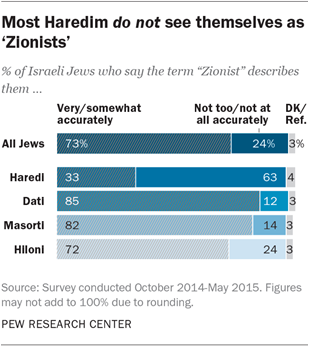
Many, but not all, Israeli Jews also identify with Zionism. Historically, the term “Zionist” usually referred to a supporter of the establishment of the State of Israel as a national homeland for the Jewish people. Today in Israel, however, “Zionist” may have additional shades of meaning, perhaps roughly equivalent to nationalist, patriotic or idealistic. Rather than trying to define the word, the survey simply asked Jewish respondents how accurately it describes them, personally.
Overall, majorities of Datiim, Masortim and Hilonim say “Zionist” describes them either very accurately or somewhat accurately. But most Haredim say the term describes them either “not too” (24%) or “not at all” (38%) accurately.6 Once again, Haredi Jews’ reluctance to describe themselves as Zionists may reflect their historical ambivalence toward the Jewish state. Among Haredim who identify as Zionists, 85% say Israel is necessary for the long-term survival of the Jewish people; by contrast, among Haredim who do not describe themselves as Zionists, just 55% agree.
Wide variation in religious observance among Israeli Jews
Across numerous measures of religious belief and practice, Haredim are consistently the most religiously observant Jewish group in Israeli society, while Hilonim are consistently the most secular. Datiim closely resemble Haredim in some ways, although they report somewhat lower levels of daily prayer and synagogue attendance. Masortim include some people who are highly observant as well as some who are not, but on several standard measures of religious observance, Masortim tend to show medium levels of religious observance.
For example, about three-quarters of Haredim say they pray at least once a day (76%), as do most Datiim (58%). By comparison, just 1% of Hilonim say they pray daily, and 79% never pray. Self-described Masortim display less uniformity in their prayer habits: About one-in-five say they pray daily (21%), 15% say they pray at least weekly, about one-third say they pray monthly or seldom (32%), and about three-in-ten Masortim (31%) say they never pray.
Similarly, majorities among both Haredim (85%) and Datiim (74%) say they attend religious services on a weekly basis, while among Hilonim, relatively few (1%) do this and 60% say they never attend synagogue. Again, Masortim display a range of worship attendance habits.
These major differences in religious commitment among the four Jewish subgroups also are reflected in many specific Jewish religious practices. For example, very few – if any – Haredim or Datiim say they travel by car, bus or train on the Jewish Sabbath (from Friday evening to Saturday evening). By comparison, travel on the Sabbath is nearly universal among Hilonim (95%). On this question, Masortim are closely divided, with a slightly higher share saying they travel on the Sabbath (53%) than saying they do not (41%).
Secular Jews’ understanding of their Jewish identity as primarily a matter of ancestry or culture is reflected in their beliefs and practices. Not only do few Hilonim say they attend synagogue on a weekly basis or pray with regularity, but many (40%) also say they do not believe in God. However, substantial proportions of Hilonim practice what could be seen as cultural aspects of their religion. For example, 87% of Hilonim say they hosted or attended a Seder last Passover, and about half (53%) say they at least sometimes light candles before the start of the Sabbath.
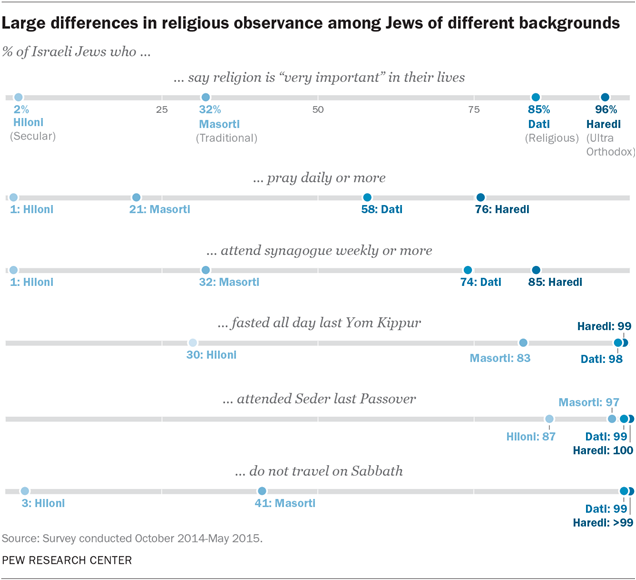
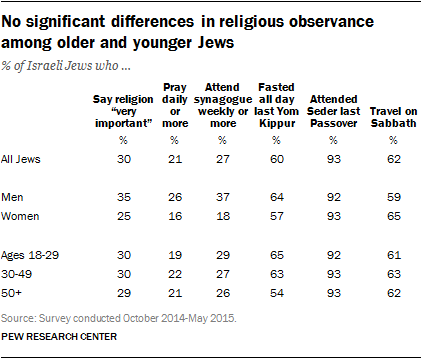
By some measures, Jewish men in Israel are more religiously observant than Jewish women. Among Haredim, Datiim and Masortim in particular, men are more likely than women to report that they pray several times a day and attend synagogue weekly. In part, this reflects the fact that Jewish law (halakha) requires daily prayer in a prayer quorum (minyan) for men and not for women, and halakha makes similar exemptions for women regarding many other mandated rituals. But the survey also finds that among Masortim, men are more likely than women to say religion is “very important” in their lives, and more Masorti men than women refrain from travel on the Jewish day of rest.
Among both highly religious and secular Jews, there are few differences in religious observance between older and younger Israeli adults.
Chapter 4 looks at measures of religious commitment in Israel in more detail.
Overall, Arabs in Israel are more religious than Jews
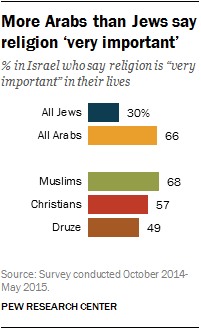
Arabs in Israel – especially Muslims – are more religiously observant than Jews as a whole. Fully two-thirds of Israeli Arabs say religion is very important in their lives, compared with just 30% of Jews. Israeli Muslims (68%), Christians (57%) and Druze (49%) all are more likely than Jews to say religion is very important to them, personally. In addition, more Arabs than Jews report that they pray daily and participate in weekly worship services.
Generally, Muslims in Israel are the most religiously observant of the four major religious groups. For example, a majority of Muslims say they pray daily (61%), compared with 34% of Christians, 26% of Druze and 21% of Jews. And while 25% of Druze, 27% of Jews and 38% of Christians say they attend religious services at least weekly, roughly half of Israeli Muslims (49%) report that they go to a mosque on at least a weekly basis.
Among Muslims in Israel, adults between the ages of 18 and 49 are generally less observant than their elders. For example, those under 50 are less likely than older Muslims to say they pray daily or attend mosque weekly. This is not the case among Jews; as previously noted, there are few, if any, significant differences in religious observance between younger and older Israeli Jewish adults.
Data collected by the Israeli Social Survey on religious observance among all non-Jews in Israel – Muslims, Christians and Druze combined – show a net uptick in the proportion of adults who say they are “very religious” or “religious,” from 51% in 2002 to 56% in 2013. Over the same 11-year period, there has been a slight net decline in the proportion of non-Jewish adults who say they are “not so religious” or “not religious,” from 49% to 44%.
(Trends over time in religious observance among Israeli Jews are discussed in a sidebar at the end of this Overview.)
Few friendships and marriages in Israel cross religious lines
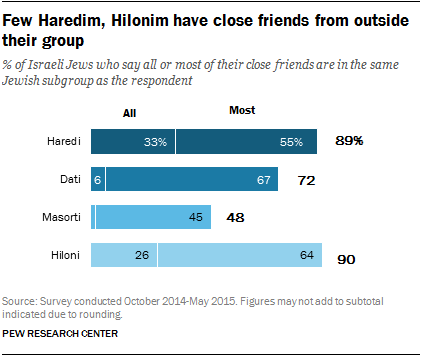
Jews and Arabs of different religious backgrounds are separated by more than just their religiosity and political opinions. The survey finds that these groups are also relatively isolated from one another socially.
This is even true within Israeli Jewry. Particularly among Haredim and Hilonim, few adults say they have many close friends from outside their own community, and intermarriage is rare. In addition, the vast majority of Haredim say they would not be comfortable if one of their children were, someday, to marry a Hiloni Jew – and vice versa.
Masortim are the one Jewish group that is more likely than others to have close friends from a variety of other Jewish groups. Only about half of Masortim (48%) say that all or most of their close friends are also Masortim; by comparison, among Haredim and Hilonim, roughly nine-in-ten adults say all or most of their close friends belong to the same Jewish subgroup. Among Datiim, 72% say all or most of their close friends are Datiim.
Similarly, 95% of married Haredim say their spouse is also Haredi, while 93% of Hilonim who have a spouse or partner say that person is Hiloni. Datiim also are very likely to have a spouse who is Dati (85%). As with friendships, Masortim are most likely to have a marriage that crosses Jewish subgroups; 64% are married to another Masorti Jew, but roughly one-third are married to a Jew they describe as either Dati (20%) or Hiloni (15%).
The vast majority of Haredim and Hilonim also are uncomfortable with the idea of future intermarriage between their two communities. About nine-in-ten Hilonim say they would be “not too” comfortable (20%) or “not at all” comfortable (73%) if their child someday married a Haredi Jew, while nearly all Haredi respondents (95%) say they would be “not too” comfortable (17%) or “not at all” comfortable” (78%) if their child were to someday marry a secular Jew. Haredim are also generally uncomfortable with the idea of their children taking a Masorti spouse (88% say they would be uncomfortable with this) or a Dati spouse (58%).
On this hypothetical question, the divisions are less stark when it comes to some other groups that are adjacent to one another on the religious spectrum. Only a minority of Masortim say they would be uncomfortable with their child marrying either a Dati or Hiloni Jew. Similarly, minorities of Datiim indicate they are uncomfortable with the idea of their child having a spouse who is Haredi or Masorti.
Hilonim are generally uncomfortable about the idea of intermarriage with Orthodox Jews – including both Haredim and Datiim. But fewer than half of Hilonim (45%) say they would be uncomfortable with the idea of their child having a spouse who is Masorti.
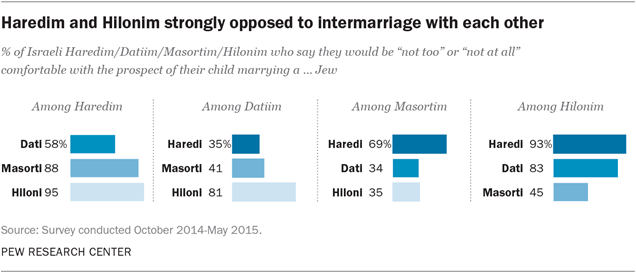
Religious intermarriages cannot be performed in Israel (although civil marriages that take place in other countries are legally recognized in Israel).7 This is reflected in the rarity of marriages between members of different religious communities in the country. Nearly all Israelis in the survey who are married or living with a partner say their spouse or partner shares their religion. Relatively few married Muslim, Christian and Druze residents (1%) say their spouse has a different religion, and only 2% of married Jews say they have a spouse who belongs to a non-Jewish religion or is religiously unaffiliated.
Not only is intermarriage rare in Israel, nearly all Israeli Jews and Arabs included in the survey say they would prefer their children to marry within their own religious circle. Among Jews, 97% say they would not be comfortable with their child someday marrying a Muslim, and 89% say this about their child ever marrying a Christian. Similarly, 82% of Muslims, 88% of Christians and 87% of Druze say they would be uncomfortable with the idea of their child marrying a Jew.
Among Arabs, there is also uneasiness with marriage between religious groups. Three-quarters of Muslims say they are not too or not at all comfortable with the idea of intermarriage with a Christian. Similarly, most Christians (80%) say they would be uncomfortable with their child marrying a Muslim. Druze are about equally opposed to the idea of one of their children marrying a Jew (87% uncomfortable), a Muslim (85%) or a Christian (87%).
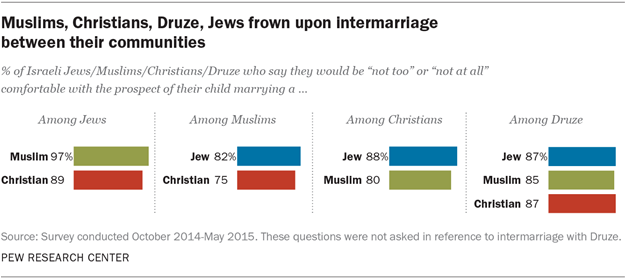
Arabs see more discrimination in Israeli society
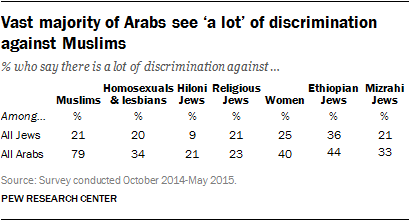
Social divisions within Israeli society may be connected to perceptions of discrimination. Roughly eight-in-ten Arabs (79%) say there is a lot of discrimination against Muslims in Israel today, while just 21% of Israeli Jews share this view.
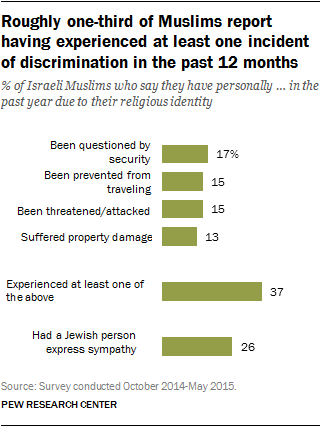
Arabs also are more inclined than Jews to perceive Israeli society as discriminatory toward a variety of other social groups. For example, 40% of Arabs say there is a lot of discrimination against women in Israel today, compared with 25% of Jews who perceive a lot of discrimination against women. And just 9% of Jews say there is a lot of discrimination against secular Jews in Israel, compared with 21% of Arabs who say secular Jews face a lot of discrimination.
The survey also asked about personal experiences with discrimination. About one-in-six Muslims say they have been questioned by security officials (17%), prevented from traveling (15%) or physically threatened or attacked (15%) because of their religion in the past 12 months, while 13% say they have suffered property damage. All told, 37% of Muslims say they have suffered at least one of these forms of discrimination because of their religious identity in the past year.8
The survey also asked about positive interactions. About a quarter of Israeli Muslims (26%) say a Jewish person has expressed concern or sympathy toward them in the past year because of their religious identity. And 15% of Christians and 18% of Druze say a Jewish person has expressed sympathy toward them in the last 12 months.
Views on discrimination in Israel, as well as Jews’ views on anti-Semitism around the world, are discussed in detail in Chapter 12.
More Arabs than Jews – by a declining margin – optimistic about two-state solution
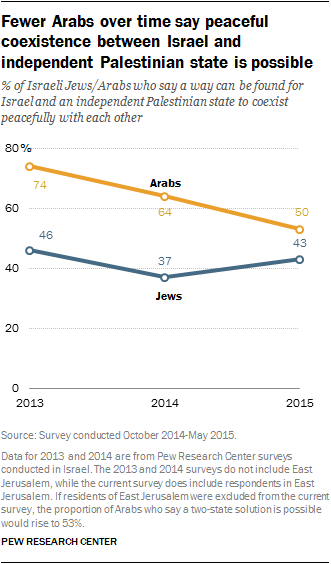
Many Arab citizens or residents of Israel appear to be losing hope that a way can be found for Israel and an independent Palestinian state to coexist peacefully. In Pew Research Center polling, the percentage of Israeli Arabs who say a peaceful, two-state solution is possible has dropped by 24 points in just two years, from 74% in 2013 to 50% in the latest survey, which was conducted in late 2014 and early 2015 (i.e., even before the wave of stabbings and other violence in Israel and the West Bank in late 2015). The new poll finds that about three-in-ten Israeli Arabs (30%) think a peaceful two-state solution is not possible, while 20% say they do not know or do not take a position either way.
As of the time of the survey, Israeli Jews were less optimistic than Israeli Arabs about the possibility of a two-state solution. Israeli Jewish public opinion had become more negative after the breakdown of peace negotiations in April 2014, then rebounded somewhat in 2015. The percentage of Israeli Jews who say a way can be found for Israel and an independent Palestinian state to coexist in peace has risen slightly from 37% in 2014 to 43% in the new survey. Opinion on this topic may continue to change as events unfold in the region.

Among Jews, a slim majority of Hilonim (56%) say Israel and an independent Palestinian state can peacefully coexist. But among other groups, the prevailing view is that a peaceful two-state solution is not possible.
Further statistical analysis finds that after controlling for religious identity (Haredi, Dati, Masorti, Hiloni) and other demographic factors such as age, gender and level of education, Israeli Jews’ opinions on the feasibility of a two-state solution are most closely tied to their political ideology.
Among the small proportion of Jews who say they are on the left side of the ideological spectrum, 86% think a way can be found for Israel and an independent Palestinian state to coexist peacefully together, compared with 29% of those on the political right and 46% of those in the center.
Plurality of Jews say West Bank settlements help secure Israel

Israeli Jews express a wide range of views on the construction of Jewish settlements – especially in the West Bank – which continue to generate controversy internationally, including recent moves by the European Union to label goods produced in the settlements. Currently about 4% of Israeli Jews live in the West Bank (not including East Jerusalem).
A plurality of all Israeli Jews surveyed (42%) say the continued building of settlements helps the security of Israel, while three-in-ten (30%) disagree, saying the settlements hurt Israel’s security. A quarter of Israeli Jews (25%) say the settlements do not make a difference one way or another with respect to Israel’s security.
Datiim are more likely than the other major Jewish subgroups in Israel to favor the settlements; about two-thirds (68%) of Datiim say settlements help Israel’s security, and only 13% say they hurt the country’s security. Fully half of Haredim and 45% of Masortim agree that the settlements help Israel’s security, while fewer (13% of Haredim and 22% of Masortim) say they hurt.
But Hilonim lean in the other direction: About four-in-ten Hilonim (42%) say settlements in the West Bank hurt Israel’s security, while 31% say they help, and the rest think they do not make much difference or do not take a position either way.
Israeli Jews’ opinions about settlements are strongly tied to their political ideology. Only 13% of those on the left side of the ideological spectrum say the building of settlements helps the security of Israel. Among those on the right, by comparison, 62% say the continued building of settlements helps the security of the country.
Israeli Jews who place themselves in the center of the ideological spectrum are evenly divided when it comes to this issue. The same proportion of political centrists (32%) take each of the three possible stances: that settlements help the security of Israel, hurt the country’s security or make no difference one way or another.
A majority of Israeli Arabs (63%) say that settlements hurt Israel’s security, including most Muslims (61%), Christians (79%) and Druze (66%).
For more details on this and other topics pertaining to the peace process, see Chapter 9.
Settlers less optimistic about peace process than Jews who live elsewhere
In this report, the 4% of Jewish respondents (3% of all Israelis) who reside in the West Bank – often broadly called “settlers” – are included in analysis of Israeli Jews overall.9 But the survey also includes enough interviews with settlers to allow comparisons between their views and those of other Israeli Jews.10
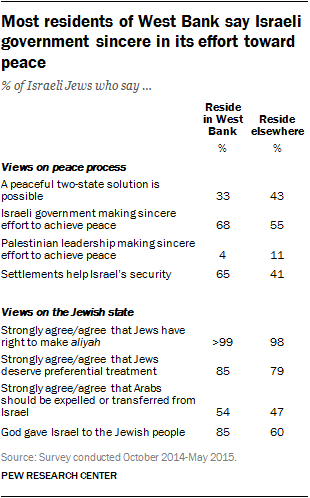
Overall, West Bank residents are far more religious than other Jews. A solid majority of Jewish respondents who live in the West Bank (63%) are Orthodox, including 26% who identify as Haredim and 36% who identify as Datiim. By comparison, 9% of Jews who live in other regions are Haredim and 12% are Datiim. Consequently, settlers are far less likely than Jews living elsewhere in Israel to identify as Masortim or Hilonim.
These religious differences are evident when it comes to views about Israel. Fully 85% of settlers, including a nearly universal proportion of Haredi and Dati settlers (>99%), say God gave Israel to the Jewish people, while a much smaller majority of other Israeli Jews (60%) express this view.
There is a similarly large gap between settlers and other Jews when it comes to the impact of the settlements themselves. Roughly two-thirds of settlers (65%) say Jewish settlements help Israel’s security; 41% of other Israeli Jews say the same. (For comparisons by Jewish subgroup between the views of settlers and Jews overall, see Chapters 8 and 9.)
Overall, residents of the West Bank are less optimistic than Jews who reside elsewhere that a way can be found for Israel and an independent Palestinian state to peacefully coexist (33% vs. 43%). At the same time, settlers are more likely than other Israeli Jews (68% vs. 55%) to say the Israeli government is making a sincere effort to reach a peace agreement. Fewer settlers than other Jews say the Palestinian leadership is sincere in its efforts toward peace, although relatively few Jews, regardless of location, see Palestinian leaders as sincere in this regard.
While settlers have somewhat different views on the peace process than other Israeli Jews, they generally take similar positions on questions concerning the rights of Jews and Arabs in Israel. For example, nearly universal shares of both groups say Jews around the world should have the right to move to Israel and gain citizenship. And roughly half of both groups agree that Arabs should be expelled or transferred from Israel, although settlers are somewhat more likely than other Jews to strongly agree with this statement (27% vs. 20%).
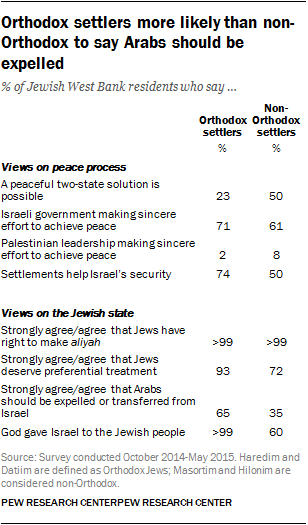
Overwhelming majorities among both West Bank settlers (85%) and other Israeli Jews (79%) agree or strongly agree that Jews deserve preferential treatment in Israel; again, more settlers than Jews living elsewhere strongly agree with this view (57% vs. 47%).
Among settlers, those who are Orthodox (Haredim and Datiim combined) are considerably less optimistic than are non-Orthodox (Masorti and Hiloni) settlers about the prospects for a peaceful two-state solution (23% vs. 50%).
Roughly one-third of Masortim and Hilonim who reside in the West Bank (35%) agree that Arabs should be expelled or transferred from Israel, compared with 65% of Haredi and Dati settlers who take this view.
Other key findings of the 2015 Pew Research Center survey include …
- Most members of all the main religious groups in Israel place great importance on family, education and career. But even within these areas of general agreement, there are some substantial differences. For example, while virtually all Hilonim (99%) say that giving their children a good general/secular education is important to them, a much smaller majority of Haredim (69%) say the same. And the opposite is true when it comes to giving children a good religious education: Nearly all Haredi respondents (>99%) say this is either “very important” or “somewhat important” to them; about half of Hilonim (54%) agree.
- Haredim are less likely than other Jews in Israel – as well as other religious groups – to value a high-paying career or the opportunity to travel around the world. Only about two-thirds of Haredim (68%) say being successful in a high-paying career is important to them, compared with roughly nine-in-ten Datiim, Masortim and Hilonim – as well as nine-in-ten Muslims, Christians and Druze. Relatively few Haredim (16%) say it is important to them to travel the world, while roughly seven-in-ten secular Jews in Israel (69%) say they value such opportunities.
- The survey asked respondents to say, in their own words, what they see as the single biggest long-term problem facing Israel. About four-in-ten Israeli Jews cite economic issues (inequality, rising housing costs, etc.), and a roughly equal number name various security-related issues (violence and terrorism, the threat from Iran, etc.) as the biggest problem. Arabs, meanwhile, are more likely to mention economic issues than any other type of response. In 2013, U.S. Jews were also asked to name the biggest long-term challenge facing Israel, and almost none (1%) mentioned economic problems, while two-thirds cited various security issues as the biggest long-term problem facing Israel.
- About one-third of Jewish men say they wear a kippa or other type of head covering in public. The type of kippa varies by Israeli subgroup, with Haredi men more likely to wear a black fabric kippa and Dati men more likely to wear a crocheted kippa (often with a pattern or color). One-in-five Israeli Jewish women also say they wear a head covering in public (either a wig, snood, scarf or hat).
- After the fall of the Soviet Union, an influx of Jews from former Soviet republics arrived in Israel during the 1990s, forming a large cohort that was notably less religiously observant than Israeli Jews overall. Many of these immigrants now have children who were born in Israel, and there are signs that members of this second generation – that is, Israeli Jews with at least one parent who was born in the former Soviet Union – are more religious than their parents (although still not as religious as Israeli Jews overall). For example, 70% of these second-generation immigrants say they believe in God, which is higher than the 55% of first-generation former Soviet immigrants who express belief in God.
- Israeli Jews are roughly evenly divided between two types of ethnic identity: Ashkenazi Jews (with ancestral roots in Central and Eastern Europe) and Sephardi or Mizrahi Jews (with roots mostly in Spain, elsewhere around the Mediterranean or the Middle East). Haredim and Hilonim are more likely to identify as Ashkenazi Jews, while Datiim and Masortim are more likely to identify as Sephardi/Mizrahi Jews.
- While Muslims living in Israel, overall, are more religious than Israeli Jews, they are less religious than Muslims living in many other countries in the region. For example, about two-thirds of Muslims in Israel (68%) say religion is very important in their lives – higher than the comparable share of Lebanese Muslims (59%), but lower than the share of Muslims in Jordan (85%), the Palestinian territories (85%) and Iraq (82%) who say this.
- There is very little religious switching (conversion) between the main religious groups in Israel. Jews, Muslims, Christians and Druze almost universally continue to identify in adulthood with the religion in which they were raised as children. But within Israeli Jewry, there has been some movement among the four major subgroups. While about nine-in-ten Israeli Jews who were raised Haredi (94%) or Hiloni (90%) still identify with those categories, only about half of those who were raised Dati still identify as Datiim (54%), and two-thirds of those raised Masorti still identify as Masortim (67%). Overall, the switching tends to be in a more secular direction. (For more details, see Chapter 2.)
How religion in Israel is changing over time
While this is Pew Research Center’s first comprehensive study of religion in Israel, data collected through the Israeli census, the Israeli Social Survey, the Guttman Center for Surveys and Pew Research Center’s previous polls in Israel suggest that the Israeli religious landscape has been changing over time in at least three important ways:
• The share of Jews in the total population has been declining, while the share of Muslims in the population gradually has been rising.
• Among Jews, the share who are Orthodox has been slowly rising, largely as a result of high fertility rates among Haredim.
• Surveys conducted over time indicate a modest decline in recent years in the share of Israeli Jews who report moderate levels of religious observance. The reported decline of what might be called the “religious middle” suggests that Israeli society may be becoming more religiously polarized.
Long term, Muslims rising as share of Israel’s population
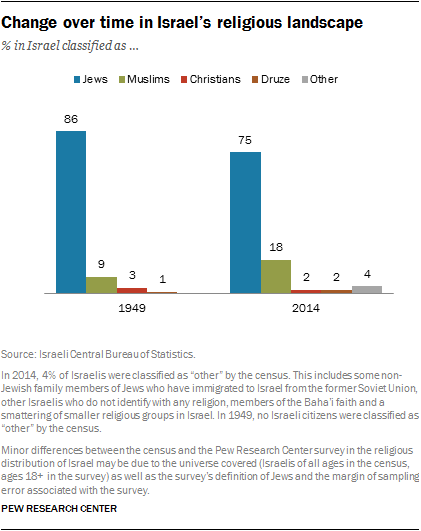
According to Israeli census data, the country’s religious landscape has been gradually changing, with a falling share of the population identifying as Jews and a rising share identifying as Muslim or choosing not to identify with any of the four main religious groups (Jews, Muslims, Christians and Druze).
In 1949, shortly after the establishment of the state, the first Israeli census found that 86% of the total population was Jewish, 9% was Muslim, 3% was Christian, and 1% was Druze. As of 2014, the Muslim proportion of the population has doubled to 18%, while the Jewish proportion has declined 11 percentage points, to 75%. The Christian share of Israel’s population also has declined, falling from 3% to 2%, while Druze have risen from 1% to 2%.
At the same time, a growing share of Israelis (4% in 2014) do not identify with any of these religious groups and are classified as “other” by the census. This includes some non-Jewish family members of Jews who have immigrated to Israel from the former Soviet Union, other Israelis who do not identify with any religion, members of the Baha’i faith and a smattering of smaller religious groups in Israel.
Orthodox slowly growing as share of Israeli Jews
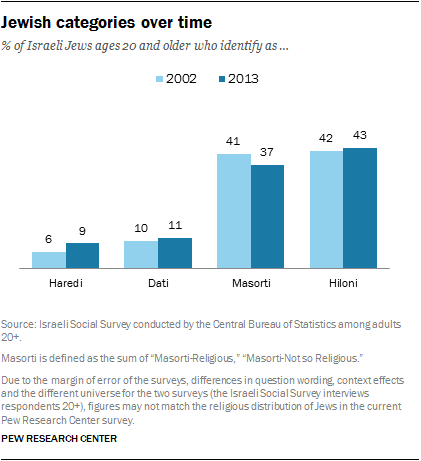
While the majority of Jewish adults in Israel do not identify as Orthodox, the Orthodox share of the population has been increasing over time. Data collected by the Israeli Social Survey (ISS) between 2002 and 2013 show the proportion of Jews ages 20 and older who are Orthodox rose from 16% to 19% over that period, while the non-Orthodox share fell from 84% to 80%. The Hiloni share has held roughly steady, while Masortim, who often show moderate levels of religious observance, have experienced the greatest net loss.11
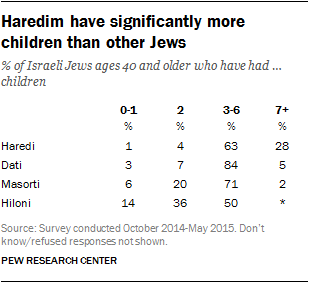
Among Jewish groups, Haredim have experienced the biggest gain over time. In the 2013 ISS, 9% of Israeli Jewish adults identified as Haredi, up from 6% a little more than a decade earlier.
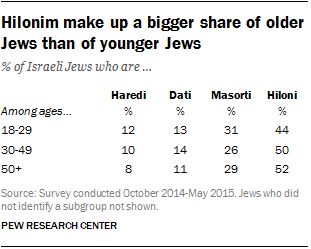
One factor in this rise is family size. The current Pew Research Center survey asked respondents how many children they have ever had; among Jewish men and women ages 40 and older, 28% of Haredim say they have at least seven children. By comparison, few Datiim (5%), Masortim (2%) and Hilonim (<1%) report having that many children.12
As a result of differences in fertility rates, Hilonim form a smaller share of Jewish adults under 30 years of age (44%) than they do of Jews ages 50 and older (52%). Among Jews between the ages of 18 and 29, 12% are Haredi, compared with 8% among those ages 50 and older.
Signs of religious polarization
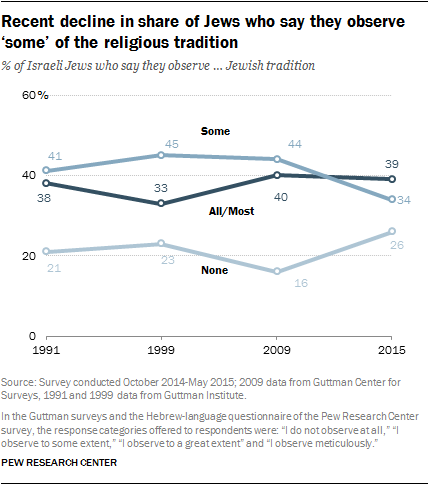
Previous polls conducted by Pew Research Center, the Guttman Center for Surveys at the Israel Democracy Institute and the former Guttman Institute indicate a decline in recent years in the share of Israeli Jews who report moderate levels of religious observance.
Comparing the results of the current survey with previous research by the Guttman Center and the former Guttman Institute shows that the share of Israeli Jews who say they follow some of the Jewish tradition has fallen to about one-third (34%), down from four-in-ten or more in Guttman surveys conducted between 1991 and 2009. The decline of the middle has been accompanied by a recent rise in the proportion of respondents who say they follow none of the Jewish tradition, while respondents who say they follow all or most of the tradition is essentially unchanged since 2009.
A similar trend is seen on a question about religion’s importance in people’s lives. Since 2007, when the question was last asked in a Pew Research Center survey, the share of Israeli Jews who say religion is “somewhat important” in their lives has decreased from 36% to 26%, while the proportion who say religion is “very important” in their lives has increased from 24% to 30%. The share who say religion is “not too important” or “not at all important” in their lives also has increased somewhat, from 38% in 2007 to 44% in the new survey.


